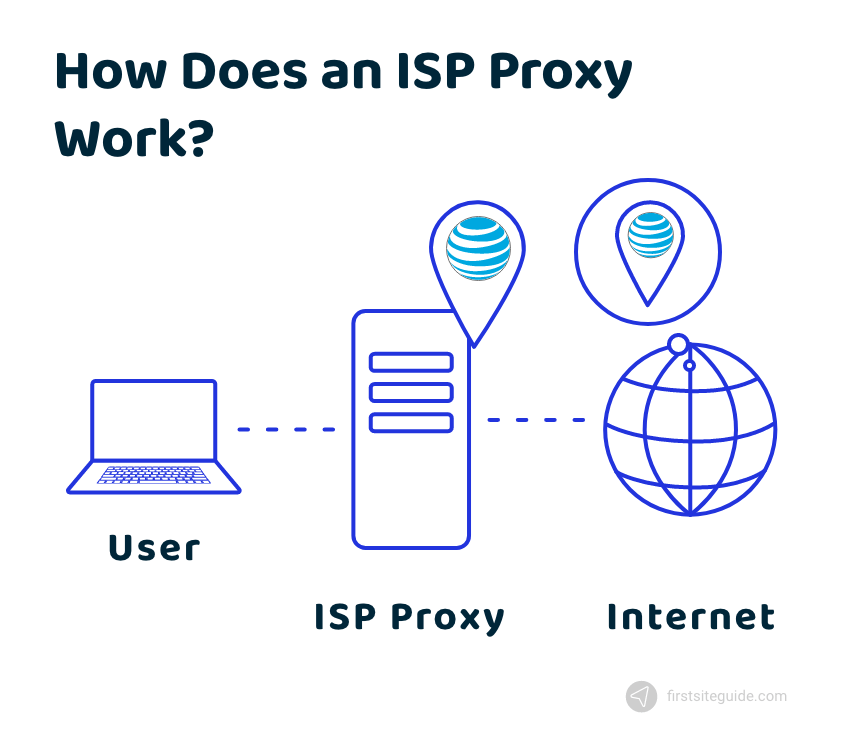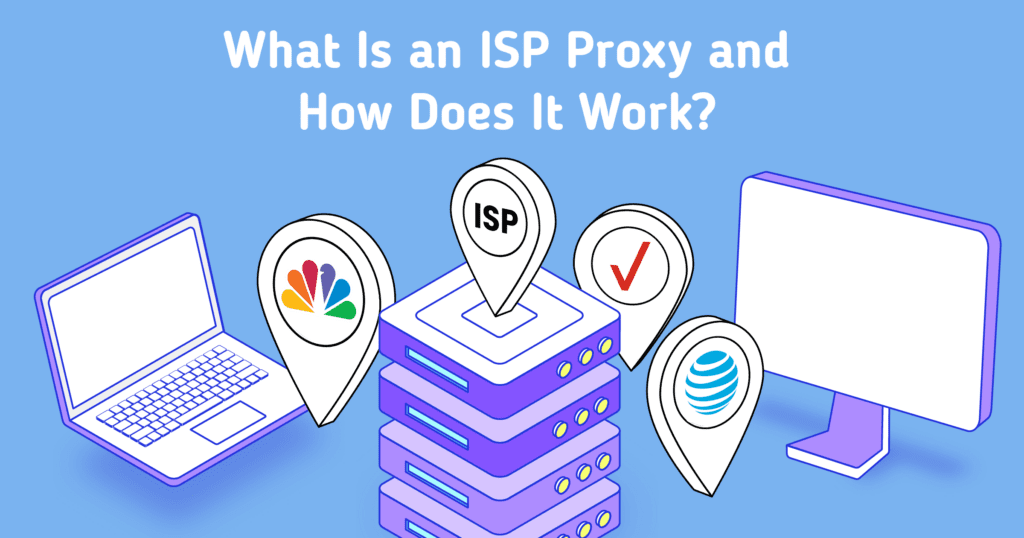Today, businesses have so many proxy services to choose from that it’s easy to lose count. With such a variety of proxy servers on the web, finding one to suit your specific needs can be challenging.
However, two proxy types stand out from the rest – residential and datacenter proxies. Even though they offer different features, they provide something that no other type of proxy can deliver: a combination of residential and datacenter proxies results in ISP proxies.
Today, we’ll talk about ISP proxies, how they work, and their benefits.
ISP proxies explained
An IPS proxy or an ISP proxy server is an intermediary between internet users and web servers. A server IPS proxy has a pool of available IP addresses. Users can access this IP pool and change their IPs according to their specific needs.
Users’ internet service providers (ISPs) assign them new IPs for every online request. While most proxy types work with end users’ desktop devices and mobile phones, ISP proxies exclusively use servers for hosting.
Since they are static by nature, most users refer to ISP proxies as static residential proxies. ISP proxies are popular among proxy users because they combine the speed, agility, and anonymity of residential, datacenter, and dedicated proxies.
They run on cloud servers – a feature that makes them ultra-fast, increasingly secure, and reliable. More importantly, they offer the anonymity of residential IPs and the speed of datacenter proxies. They do so by hosting IPs from internet service providers on datacenter servers.
How these proxies work
ISP proxies work just like any proxy server. They assign a new IP address for every online request and secure your connection by hiding your location and IP address. A new IP address allows you to visit multiple websites without seeming suspicious.

While datacenter IPs are fast and cheap, they are easily detected and blocked by target websites. Although you can conquer this challenge with virtually undetectable residential IPs, they’re expensive since they come from real devices.
ISP proxy services combine the benefits of residential and datacenter proxies by providing a secure and fast pool of residential IPs hosted on a datacenter server. Users receive access to safe and anonymous IPs that they can use for residential and commercial purposes.
Main benefits of ISP proxies
Let’s quickly examine the most important benefits of ISP proxies.
Anonymity
ISP proxies offer more legitimacy and higher anonymity than most proxy types since ISPs assign them. The assigned IPs look like legitimate IPs to target websites. This legitimacy allows users to bypass various anti-scraping and security measures that rely on IP identification.
Bandwidth
ISP proxies offer almost unlimited bandwidth. However, that depends on the pricing model that you choose. ISP proxy service providers don’t apply the residential proxy pricing model that charges by consumed traffic.
Instead, the user receives control over individual IP addresses and can use them for large-scale online tasks such as scraping multiple websites. In addition, ISP proxies are perfect web scraping tools as they come with bulk IPs.
Rotation options
ISP proxies offer you unprecedented IP rotation options. You can perform multiple online tasks such as:
- Copping sneakers;
- Managing multiple social media;
- Web scraping;
- Market research; and
- SEO monitoring.
ISP proxy service providers also provide access to backconnect servers and sticky (static) IPs that you can rotate according to your needs.
Great uptime
With ISP proxies, your commercial servers will secure 99.99% uptime. ISP proxy services offer additional features, such as:
- Maximum performance – high-speed internet connection and web caching to keep your web servers running at top performance; and
- Security – aside from maximum uptime, you receive access to web analytics, auditing, and filtering, including a firewall and end-to-end encryption for top cybersecurity protection.
Speed
Since ISP proxies provide a vast IP pool, the speed of datacenter IPs, and the legitimacy and anonymity of residential proxy servers, they can make your online activities, such as web scraping, more reliable and efficient.
In addition, ISP proxies eliminate well-known data scraping challenges such as connection throttling, bandwidth issues, and slowdowns from rate limitations.
Common uses
Here are the five most common use cases for ISP proxies.
Scraping
Web scraping or data scraping is the process of browsing the web, targeting content on web pages, and extracting data for further analysis. While scraping one or two websites won’t trigger many interferences, large-scale scraping operations are prone to IP bans and scraper blocking.
This is why you must frequently change your IP and location to access content in different areas. The amount of data that you wish to scrape is also a determining factor in your web scraping success.
Since ISP proxies are incredibly fast and virtually undetectable, you can use them to scrape multiple websites and extract large amounts of data promptly.
Accessing geo-blocked content
Modern websites utilize geo-targeting and restricting measures to control the number of requests that internet users can send with a single IP or to prevent downloading too much data from their respective web pages.
You’ll be detected and permanently banned if you try to scrape such websites using a single IP.
ISP proxies can help you to bypass geo-restriction and anti-scraping mechanisms by appearing as a regular internet user with a real IP address.
ISP proxies assign new IPs for each scraping request, thus allowing you to access social media networks, search engine results, advertising sites, and eCommerce and retail platforms.
Ad verification
ISP proxies can help you validate advertising statistics and ensure that you receive your money’s worth. More often than not, advertising companies will take your money but fail to deliver on their promises.
ISP proxy services can help you to verify your advertising campaigns by scanning the web to see if the ads displayed online provide the desired results, such as:
- Reaching the target audience;
- Appearing on the right websites; and
- Meeting industry standards.
ISP proxies will target millions of websites to check ad efficiency and prevent IP blocking due to overuse.
Social media monitoring
Social media monitoring is similar to SEO monitoring. However, it deals with activity on social media networks rather than search engine results. If you’re too active on multiple social media networks, that can raise suspicion.
Marketers and businesses must manage multiple social media accounts to go about their daily business. The problem is that most of them do this using a single IP.
Since social media bans or blocks such behavior, you can use ISP proxies to assign you new IPs for each social media account and prevent being banned or blocked from a platform.
SEO monitoring
SEO monitoring is crucial for digital businesses as it helps them validate the visibility of their content, products, services, websites, and more. They can rely on SEO monitoring techniques to make their websites rank higher in search engines and attract more potential customers.
Your search engine rankings depend on multiple factors, such as web browser cookies and your location. They can affect search engine results. You can bypass these issues with ISP proxies by rotating IPs and changing your location.
Potential challenges
No matter how beneficial ISP proxies may seem, they’re not without a few challenges. Here are some things to keep in mind.
Cost-efficiency
ISP proxies may be pricier than residential or datacenter proxy services due to their sourcing. You have two options for purchasing ISP proxies:
- Per IP address – private or residential proxies could be more affordable; or
- Per traffic – residential proxies are cheaper per gigabyte.
Limited locations
Even though ISP proxy providers have servers worldwide, renting multiple servers could be pricier than using solutions such as peer-to-peer residential networks.
Compared to P2P networks, ISP proxies offer fewer server locations. In addition, you should add charges for maintaining multiple servers to the high price of ISP proxies.
Fewer subnets
Despite having an impressive variety of subnets, ISP proxies can’t come close to P2P residential proxies.
Conclusion
ISP proxies match the anonymity of residential proxies and the speed of datacenter IPs. While they have a few flaws, such as a high price, limited server locations, and fewer subnets, ISP proxies are ideal for web scraping, SEO and social media monitoring, ad verification, and anonymous web browsing.
You’ll need anonymity and speed if you’re running an eCommerce business or managing multiple social media accounts and ISP proxies provide both.

